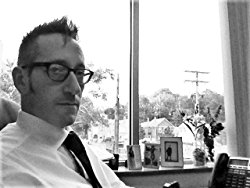By MICHAEL DAVIDOW, Radio Free New Hampshire
I went away for a little while, and I have not yet completely returned. It was nowhere fun. I was sick and being sick is like traveling. You see new things, you have new thoughts, you come home again, and you have new memories. But it’s no fun. The things you see, the things you think, the things you remember, all appear in shades of gray.
It was not Covid, which would have been a different sort of ride. It was one of those things that happen, instead; something ordinary, and it was finally dealt with in an ordinary way. To get there, though, I took the long route. I went to the emergency room, I went to urgent care, I went to the hospital for a few days, and I finally needed surgery. My head is still spinning. It will take some time before I process these events.
The emergency room where I spent many hours was a cauldron of poverty and despair. The hospital personnel who oversaw that space seemed to despise its denizens. The misery on display beggars description. It was not third-world, it was not medieval, and it was not mechanical, but it was all of those things. It gave me a glimpse of the end of the world, where our advanced technology grinds to a halt and we are left to find comfort in the hard metal edges of broken machinery. I also left that place with all my symptoms intact, made better only by the knowledge that anywhere, anywhere, was better than being there. Anybody who questions the state of our national health system should get sick and rely on that system for emergency care.
I also spent hours in different examination rooms, staring grimly at plasticized posters of body parts with all their anatomical specifics clearly and lovingly labeled for study. I do not know who decided that patients need to look at these things in their moments of stress and despair, but it was someone who hates patients. I would rather look at a plant, myself. Or a painting of some flowers. Or the serious face of somebody’s dog. Mostly I would like to look through a window.
I saw many doctors and other health professionals. Very few of them saw me back, or if they did, they didn’t see much of me. This was an additional source of pain and discomfort at a time when I had plenty to start with. I remember specific moments of kindness, when someone reached out with a friendly touch, or asked me for more than an efficient summary of my symptomology, and those moments were like cool water in the desert.
Most of the people who treated me failed to grasp what my problem actually was. They kept asking me about it, and treating me for what I said, but I didn’t know it myself. So there’s that.
In the hospital I saw how hard our nurses work, and how antique our culture remains. Nurses in particular are still subject to the most basic discrimination. Patients don’t hesitate to treat them like sex objects, and they put up with it, for reasons of care protocol. It was sad to see.
With my illness and my surgery and everything that came with those things, I saw my world turn inwards. I stopped working, and I stopped writing. I became a father and husband in name only. I became more self-centered, and miserably so, than I can recall from the most solipsistic days of my childhood. I saw everything through the lens of my illness, and that lens was both dark and distorting, as well as possessed of both stunning clarity and the most chilling of all truths. There is an entire psychology of illness to be studied and most health professionals seem so wrapped up in their own specialties that their patients are left alone to navigate it blind.
I would like to think that I learned something from this ordeal. I would like to think that I kept my eyes and ears open, and I came away with valuable insights. But I can’t say that’s true. What I learned boiled down to this: that the world doesn’t care about sick people, and sick people don’t care about the world. When all of this was happening, I would stare at the headlines in the New York Times, and I would look away. I had my own problems to solve. And even now I am returning from afar. I still shudder at times, for very little reason.
So perhaps when we wonder why certain members of our community don’t seem to care about the icecaps melting, or about the poverty of others, or about the unfairness of our different social systems, we should keep this in mind: true good health is both rare and beautiful, and to enjoy it is to be hugely fortunate.
Many of us are sick and weak, and we need more help before we can pick up our heads again, to love and cherish the world around us.
Michael Davidow is a lawyer in Nashua. He is the author of Gate City, Split Thirty, and The Rocketdyne Commission, three novels about politics and advertising which, taken together, form The Henry Bell Project, The Book of Order, and his most recent one, The Hunter of Talyashevka . They are available on Amazon and Barnes and Noble.





